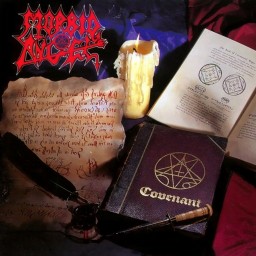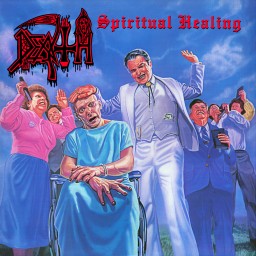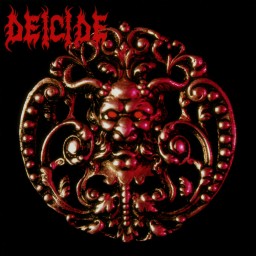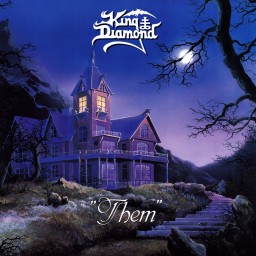Emir's Reviews
For me, Covenant is by far the best Morbid Angel record. It not only perfectly reflects the band's evolution in 1993, but also combines the identities of the previous two albums. Take the speed and brutality of Altars of Madness, and add the sophisticated songwriting of Blessed Are the Sick. Finally, give this result to Flemming Rasmussen, the legendary producer of the three great Metallica albums, and then release it. You will have Covenant. Period.
While musically more ferocious, Covenant is also more satanic, thematically. Yes, the issue with Morbid Angel was being satanic as much as possible around that time, but the songs like "Lions Den", "World of Shit (The Promised Land)", and especially "God of Emptiness" increase the anti-religious and satanic tone dramatically, and make you understand why they call the band MORBID ANGEL. Lovecraftian themes are still present, but less visible compared to the previous albums. Cthullu Mythos would dominate Morbid Angel again, after Vincent left the band and Steve Tucker joined.
The best aspect of the album is that when it is slower, it becomes more horrific. As I said, this is one of the fastest and brutal records the band has ever released, but after the closer duo of the album, "Nar Mattaru/God of Emptiness", Morbid Angel leaves the scene in quite an unorthodox way. You would rightly expect that the ending of an album like this might have been a massacre. But, no. Morbid Angel had a different attitude this time. the way David Vincent sings the lines below ultimately became the essence of death metal: bold, imposing, and fear-inducing in its overconfidence:
"Bow to me faithfully,
Bow to me splendidly."
Genres: Death Metal
Format: Album
Year: 1993
It took me a long time to fully appreciate the value of this album because Death was such a monument in the history of death metal that each work required quite some time to be digested in my soul. For the first impression, Spiritual Healing is quite mediocre, especially compared to the albums succeeding it. However, once you reclaim your mesmerized brain after the four albums the band put forward, you actually realize that Spiritual Healing is actually fed with so much raw emotion blended with old-school horror.
Lunatic asylums, hypocrite priests, medical nightmares, and a world full of conspiracies... A mind that is shattered between the morbidity of reality and the games of its own hallucinations.... This album is overall quite psychological as much as horrific. Rather than "healing", it is almost dissecting "spirituality". Both lyrically and musically, the album tells us how our spiritual existence and the material world surrounding it became a stage that degrades our physical and mental integrity, eventually "Altering the Future" within the world of "Genetic Reconstruction". Therefore, Spiritual Healing can be defined as the first album on which Death, or specifically Chuck Schuldiner (R.I.P.) starts to "philosophize" death metal themes.
Years after this album, Schuldiner would say in an interview: "Reality is far more evil than a demon". Yes, Spiritual Healing is the beginning point of this realism.
In terms of the band's discography, Spiritual Healing plays a key role in the musical evolution of the band, as it was on this album that the first attempts at later experiments and progressive trends that would put Death into a legendary category were made.
Musically, the highlight of the album is the lead guitar duels of Chuck Schuldiner and James Murphy. Such collaboration is exactly what makes the album quite melodic in both riff and solo arrangements, without sacrificing death metal identity.
It may not be one of the highlights of Death's career, yet it is definitely a "must-have", both for the band and for the fans.
Trivia: Chuck's vocals in this album are the favorite "Schuldiner vocals" for the ex-Morbid Angel frontman, David Vincent. If you carefully listen to the vocal style in Blessed Are The Sick, you can easily hear the influence.
Genres: Death Metal
Format: Album
Year: 1990
The legendary debut of the Florida death metal band Deicide was not a small issue. Many extreme metal bands were around at that time, claiming the title of "the most satanic and blasphemous band the world has ever seen". Bands such as Morbid Angel, the early phases of Immolation, Incantation, the Norwegian and Finnish black metal circles, etc., indeed created some of the most devastating albums in support of that claim. However, let's admit that none could sound as furious, satanic, and possessed as the early era Deicide. Indeed, the early Deicide was something else.
As soon as you start to listen to Deicide, you open the gates of Hell and see how morbid, vengeful, dedicated, and scary could be the world of the Biblical Satan. Inspired by the atonal and cacophonic lead guitar work of Slayer, combining Dave Lombardo's style with non-stop blast-beat attacks, and surrounding such instrumentation with the themes of Possessed's Seven Churches or Sarcófago's I.N.R.I. , Deicide became the epitome of "satanic death metal". Last but not least, you also have to give credit to Glen Benton for the identity of this album. Simultaneous manifestation of brutal and scream vocals together with vulgar and hyper-offensive lyrics delivered by Benton was even above the standards set by Morbid Angel via Altars of Madness.
Once you listen to the songs like "Sacrifical Suicide", "Crucifixation", and "Carnage in the Temple of the Damned", you suddenly understand that this album is not a joke or a cartoonish satanic cookie monster. No... With this album, Deicide basically showed their middle finger to those who claim themselves "satanic" and said, "Really? Let's find out who really is...".
For some, the album may sound a bit repetitive after a few songs, but this also contributes to the overall ambience created by the album. Due to the intense and non-stop violence delivered by the band, the listener may easily become numb, like after consuming too much hot and spicy food, you can't feel your lips. This "satanic lethargy" is the purpose of the album.
In the end, it would not be wrong to say that Deicide was one of the most, if not the most, evil-sounding and nefarious death metal records a band could create.
Genres: Death Metal
Format: Album
Year: 1990
The first impression I have regarding this album is that it lacks the musical integrity Abigail has. In other words, the album doesn't sound as monolithic as its predecessor. But don't get me wrong, Them isn't bad at all. Indeed, it's one of the best albums King Diamond has ever produced. The major drawback is that in Abigail, the story and the music were so in tune and integrated that the whole album flowed like a stream, while in Them, the technical proficiency of the band and the level of progressiveness in song structures seem to level up, but this also makes the album less fluent, less memorable, and naturally, more ambitious. Even the album cover, showing a house in the night, seems to evoke "A Mansion in Darkness" in Abigail, as if pointing out an idea that the major story was told previously. Nevertheless, you still have a very good record and one of the finest moments in King Diamond's career.
Recommended songs for the first listeners:
- "Welcome Home": the legendary opener of the album - if you don't count the intro "Out from the Asylum" - and one of the most popular King Diamond songs.
- "The Invisible Guest": a song that is quite "power metal" in essence, but delights in horror! Also, many good solos.
- "Bye, Bye Missy": I think the best riff in the album opens this song.
- "Twilight Symphony": the last show in the album is there.
If you loved King Diamond at first sight, it is almost impossible to neglect Them.
Genres: Heavy Metal
Format: Album
Year: 1988













